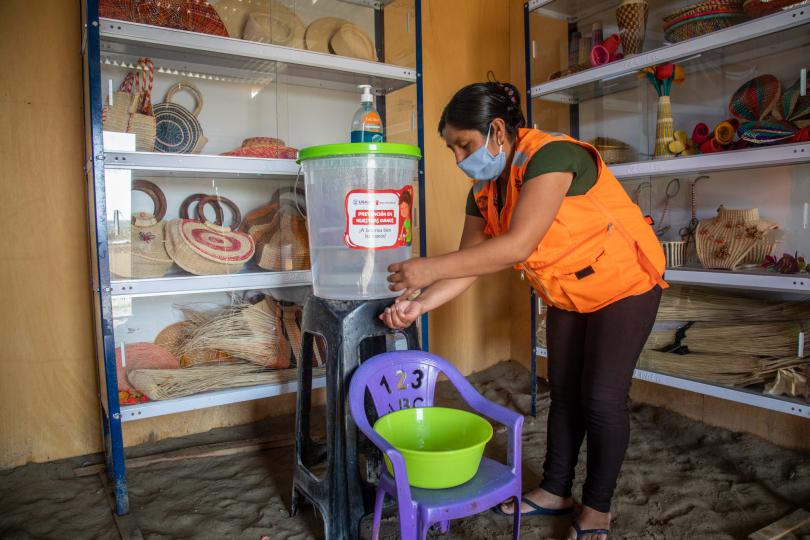JENNY: LEADING THE FIGHT AGAINST COVID-19 IN NUEVO SANTA ROSA

Jenny is 36 years old and lived in the village of Santa Rosa, in Cura Mori, until a terrible flood in 2017, due to the El Niño, left her and her family without a place to live. Jenny has since rebuilt her home in Nuevo Santa Rosa, a desert area that is also part of the same district. Her willingness to help her neighbours and her organizational skills have made her a community leader. She takes part in the organization of a communal food pot share amongst neighbours and is also part of the Disaster Risk Management Committee in her town. During the pandemic, she has also started working hand in hand with Save the Children to raise awareness about the risks of COVID-19 and prevent the spread of this epidemic in Cura Mori.
"When we got here there was nothing. It was a desert, there was no light, no water. But little by little, organizing as neighbours and with the support of organizations like Save the Children, we have been able to build a community."
Jenny has always been tenacious; she has always refused to be beaten by circumstance. "I do everything for the wellbeing of my children," she says. So, when she had to leave her flooded home behind, she decided to do everything in her power to rebuild her community and create a safe neighbourhood for her son and other local children.
"Each of the residents has made great efforts. They have raised their huts with rustic material, with their own effort. We already have a safer, wider place, and we can raise animals in order to survive."
In 2019, in coordination with Save the Children and with the change in municipal management, the Community Committee for Disaster Risk Management was formed. Without hesitation, Jenny decided to join it. She participated in various workshops facilitated by Save the Children: "They trained us. I invited more young people to get involved, because they should also have the opportunity to lead in our community." The committee has managed to ensure that dozens of families in Nuevo Santa Rosa have a family emergency plan and know the escape routes in the event of a possible disaster.
“In addition to working on the communal food pot, I have also managed to gather and organize many (female) entrepreneurs who work with paja toquilla* in Nuevo Santa Rosa. As an association, we have even participated at fairs”.
Jenny has also been appointed as secretary of the women of her area. “I have managed several projects to motivate the participation of women in all spaces. Now many women are leading their own ventures and activities, without fear that their husbands will be upset.” Thanks to USAID’s Bureau for Humanitarian Assistance, Save the Children has implemented workshops for the prevention of gender violence and the protection of children through a previous project in their town.
“The pandemic has been another misfortune for us because we did not have work, we did not have food. Nobody really imagined it. Nobody had stored food or anything, because we earn our livelihoods on a day to day basis”.
The pandemic arrived and the residents of Nuevo Santa Rosa felt hopeless again. “Fortunately, many have been able to make a living from their own vegetable plots and from raising animals. But the main problem was that we didn't have water or electricity and taking care of ourselves was more difficult,” says Jenny.
"Thanks to Save the Children, which always supports us, we were able to receive a hygiene kit to prevent the spread of the coronavirus. It contains liquid soap, bleach and a bucket to collect water."
In addition, community leaders are in constant contact with the institution to help disseminate information to prevent the spread of the coronavirus. Leaders like Jenny work tirelessly to share these measures and protect their town and family.
The project “Prevention in our hands: healthy and protected families” is implemented by Save the Children, with the support of USAID’s Bureau for Humanitarian Assistance (BHA). It proposes an integrated response to the health emergency in Peru, which includes WASH (water, sanitation and hygiene) activities, prevention of gender violence and protection of children. The project’s areas of intervention include four districts, divided between Lima and Piura. Both regions have been hit hard by COVID-19, with children, women and those with restricted access to basic services such as water and electricity being the most affected.
* local fibre used for crafts



